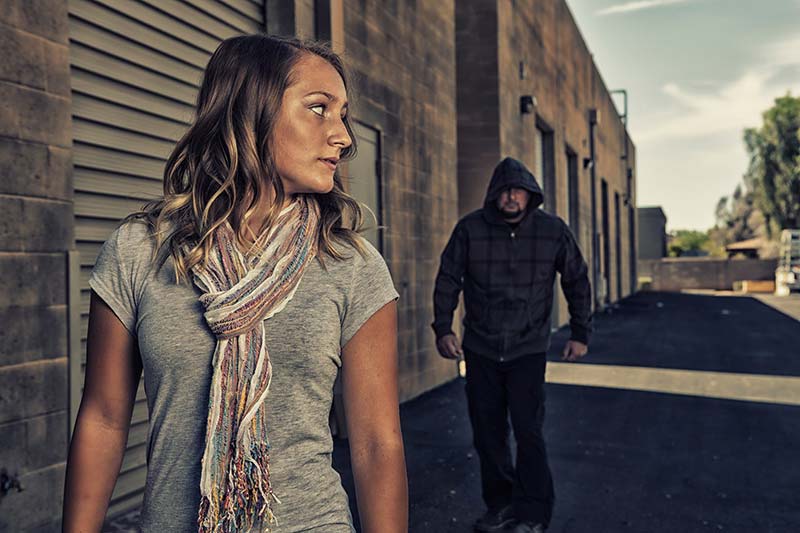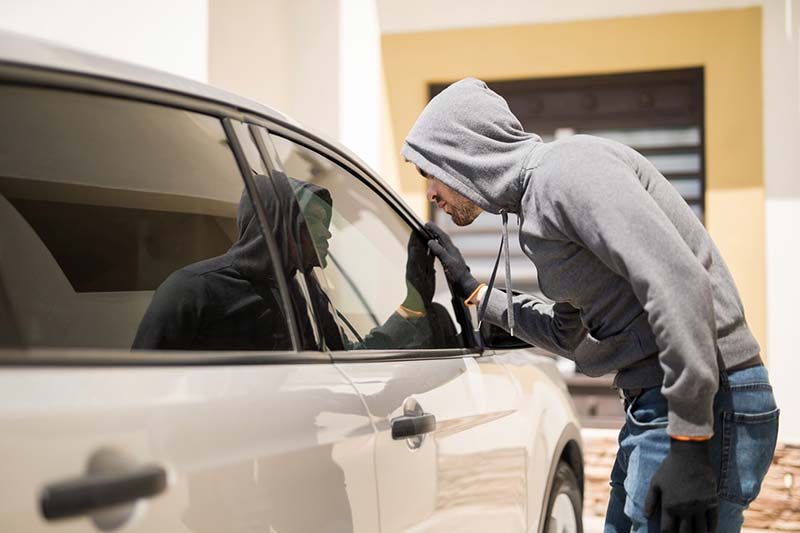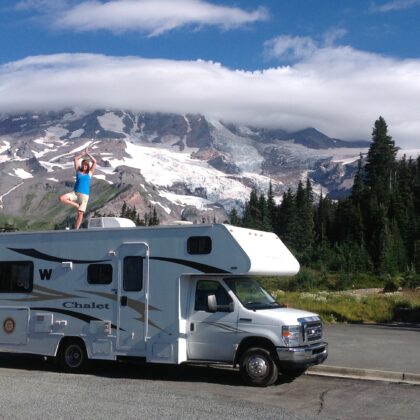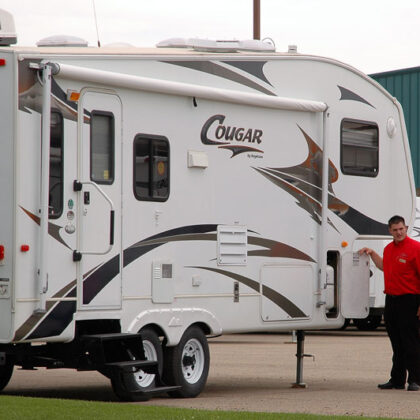Personal safety is not always convenient, nor is it fun to talk about it. But we need to think about and practice good safety habits by staying alert and being aware of our surroundings.

by Greg Gerber

Dennis and Tracie Utley started Workamping in 2019. Prior to that, Tracie’s career involved making personal protection presentations for the National Rifle Association (NRA) to encourage people to refuse to be victims.
The course was initially developed in 1993 specifically for women to ensure they had multiple tools at their disposal so they didn’t fall into situations where they could become victims. However, the association soon realized the information applied across the board.
“The biggest tool, hands down, is using situational awareness to protect yourself and avoid the bad things that could come your way,” Tracie said.
“Some people have a criminal mindset and set out daily to do harm and steal things from people,” she explained. “But, you also have people who are opportunists who take things and do things only if an opportunity comes up.”
For example, they see a $100 bill, cell phone or credit card on a table. They didn’t wake up that day planning to commit a crime, but couldn’t resist an easy opportunity.
What is a Criminal?
Criminals come in all different shapes and sizes. They may be disheveled in appearance and even frightening. They can also be someone asking for money in a parking lot.
“The problem is they don’t all look scary, so we may let our guard down,” Tracie said. “We start to trust the person, even if he or she gets a little too close for comfort. Then, denial sets in and you tell yourself nothing bad can be happening, so you give them some money and they try to take your whole wallet or even grab you.”
Dennis explained it’s wise to avoid allowing suspicious people to come within 21 feet of you because, if they decide to attack you, they can close that distance in a second and a half.
“Criminals look for vulnerability and opportunities. They view niceness as weakness. They lack compassion and mercy,” Tracie added. “We don’t want to become a soft target, meaning it’s easier for criminals to act. We want to be hard targets by making it difficult for them to want to come toward us.”
Once put into practice, personal protection skills can be utilized all the time, no matter where you are or where you’re going, she added. For example, when planning a trip, people need a general idea of where they will spend the night, have dinner, get fuel, or stop to visit.
“You need some kind of timeframe regarding when you will arrive, so you aren’t traveling when it’s dark,” Tracie said. “The biggest thing to do is trust your gut. If something just doesn’t feel right, be bold enough to act on those feelings and not continue forward.
“So, if you pull into a gas station and it doesn’t look right, just turn around and get out of that situation,” she explained. “The same applies to a boondocking spot, rest area, or even a Walmart parking lot.”
One of the biggest problems people have, especially women, is they deny their feelings by thinking they’re just over-reacting.
“I was involved in a few situations where I didn’t trust my gut, and I wish I had,” Tracie said. “Something was just off about the person – big time – but I didn’t say anything to my husband.”
“One time, I had personal contact with an individual because we were at the same restaurant he was. When we left the restaurant together, Tracie started having weird feelings about the man,” Dennis explained. “Two weeks later, we learned he had murdered his parents.”
“I didn’t trust my gut to say anything to Dennis, but I should have said something right then,” Tracie noted. “Your gut instinct is truly a gift. You need to trust it and act on it, even if it means moving on without stopping.”
Another time, Dennis and Tracie were on a cruise and visiting Puerto Rico. They had just completed an excursion and were headed back to the ship.
“We saw a place where we could take a really cool picture with our ship in the background,” Tracie said. “It was like 5:30 p.m. and still light outside. While taking a short walk to the spot we wanted to take the picture, Dennis was approached by a man.”
The man went on to tell Dennis he was from America and his father was just beat up. He was dressed in a polo shirt and khaki pants, so to Dennis, he didn’t look like a bad guy at all. Although the way he was talking and telling too much by continuously adding to the story, Dennis knew something was wrong.
“When I started questioning him as to where his dad was, his story just fell apart, so I immediately told him to go away, and he left,” Dennis explained. “He targeted us because we were more concerned about taking a picture with the cruise ship. We lost a bit of our self-awareness. Fortunately, I was able to get it back quickly enough to avoid a real problem.”
Be Assertive
When involved in a potentially dangerous situation, the tone of your voice and choice of words should indicate “no” means “no” and the person needs to move on, Dennis said.
“He was Caucasian, had on nice khaki pants with his polo shirt tucked in and his hair neatly combed. He appeared to be non-threatening,” Tracie explained. “Don’t get caught up thinking criminals are going to look like criminals. When the guy knew he wasn’t going to get anywhere with us, I promise you he moved on to somebody else.”
“Your reaction is what makes a criminal realize you are on to him and he doesn’t want to mess with you,” Dennis said.
Prepare for Encounters
People generally feel safe inside their homes and have a low level of awareness of what’s taking place around them.
Tracie recommended that when arriving to your house, RV, or hotel room, create a low level of awareness by doing things like locking doors and compartments, or closing the drapes.
A moderate level of awareness is required when you are traveling because you are in unfamiliar surroundings and around strangers. A grocery store is an example. It’s in a strange neighborhood with an unfamiliar layout where you will encounter people you’ve never seen before.
“Making eye contact with people lets them know you saw them and are aware of their presence,” Tracie explained. “Doing that tells criminals to just move on.”
A high level of awareness may be needed when you don’t know whether you’re in a good or bad area. This could happen if you go out to eat and wind up in a neighborhood with a lot of graffiti on the walls and people loitering on the sidewalk.
“When you feel those spidey-senses kicking in, that’s when a higher level of awareness is needed,” she Tracie. “It’s a mistake to go into an area that is supposed to be fun without taking any personal protection items because you think the business will protect you. That’s just wrong. You always need to be aware.”
Dennis recommended adopting a code word for your partner, and especially your children, to alert them that extra awareness is necessary.
“You could choose the word ‘Skittles.’ Who is going to get paranoid if they hear the word ‘Skittles?’” he proposed. “But, when your kids hear you say that word, they know they need to pay closer attention to you and stay close. It’s a word that tells family members I noticed something you may not have seen.”
Practice Ensures Preparedness
To ensure they are ready for a possible encounter, couples and families should practice what they are going to say and how they are going to say it when someone gets too close for comfort.
“Tone of voice is important. It doesn’t have to be loud, just forceful enough to show you mean business. It’s often the same tone you would use to keep kids from running into traffic,” Tracie said. “Without training and practice, when there comes a time it’s really needed, you won’t have the skills. You will resort to basic instinct, which may not be enough.”
Have an Escape Plan
When going into a restaurant or other business, like a laundromat or store, it’s important to formulate a plan if you need to leave that place quickly.
“If something happens and you’re not able to go out the front door again, are you prepared to go through a door with a sign that says ‘Employees only,’ or are you prepared to break a window to get away?” Tracie asked.
She added that part of practicing and developing a plan is to play the ‘what if game,’ – to help you start thinking about options.
One example they proposed is what would you do if someone approaches you in a store or parking lot? They recommended that you always sit at a restaurant so you can see what is going on and never have your back to the door.
“We play this game with friends and they come up with doozies of scenarios, and ask us what we would do in that situation,” Tracie explained. “It makes us think, and sometimes they are surprised by our answers. That’s the point. There is no one-size-fits-all approach. Having a plan makes you a hard target that a criminal doesn’t want to attack.”

Reduce Distraction
Another important safety tip is to never leave your home without your cell phone. It’s just as important as not getting into a car without buckling your seatbelt, Dennis noted.
Tracie chimed in to remind that the devices can also be terribly distracting by keeping your attention on the little screen, responding to notifications and not being aware of your surroundings. Wearing earbuds in a strange place will also create a false sense of security, and work to distract you from people or situations that need closer scrutiny.
When Were You Last Scared?
In their presentations, Dennis asks people to recall the last time they were truly scared, and the responses follow a pattern.
“Men will rack their brains trying to think of the last time they were scared,” he explained. “But a woman will often say things like, ‘This morning, when I was at the fuel pump or yesterday when I was in the grocery store with my daughter.’
“That’s why mindset and mental preparedness is different for every individual,” Dennis said. “Your preparedness will be affected by how you see things and how you feel about certain situations. Trust what your spouse or children are saying to you because their perception may be correct.”
“You can’t be 100% on guard all the time because there are going to be distractions, and it’s hard to maintain a high-level of awareness,” Tracie said. “However, eventually, you start to see mistakes being made by other people, and you can avoid making those same errors.”
Personal protection devices
Tracie and Dennis recommend some common, easy-to-use tools to help keep you safe. They include:
- Pepper spray or bear spray
- Walking sticks
- Pens
- Flashlights
- Heavier water bottles, not the crushable plastic kind
“We strongly encourage people to have multiple layers of protection. But, situational awareness is No. 1 for avoiding problems which have potential for bad outcomes,” Tracie said. “Personal safety is not always convenient, nor is it fun to talk about it. But we need to think about and practice good safety habits by staying alert and being aware of our surroundings.”
Enjoy Life
Dennis said their goal in teaching personal protection is not to make people scared and paranoid. Rather, he wants people to be able to enjoy their lives.
“We watch a lot of YouTube videos made by people who live full time in their RVs, and there are some scary stories out there,” he added. “So, don’t think it doesn’t happen.
“I think 99.9% of people in an RV campground are very friendly and very helpful. They are your friends,” Dennis said. “But, there are always individuals who are looking for something or capitalizing on opportunities. Just be more self-aware so you don’t end up being the victim.”
“The best way to become a statistic of a criminal act is to think it can’t happen to you,” Tracie said.
To connect with the Utleys, email them at tudullc@gmail.com.
Thanks for reading the Gone Workamping blog from Workamper News. Join Workamper.com today to see all the new job opportunities for RVers, as well as the training and resources to confidently find the right Workamping job for you – easily and securely.






